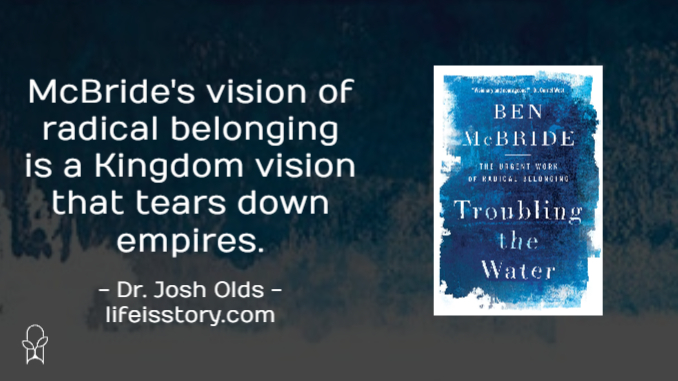
Published by Broadleaf Books on October 24, 2023
Genres: Non-Fiction, Racial Reconciliation
Buy on Amazon
Goodreads

Can you imagine a future that includes your enemies? If not, what happens next?
From one of the most courageous and visionary leaders of our time comes Troubling the Water, an immersive book about the violence and injustice that threaten to drown us all. Activist Ben McBride recounts how he first waded into the water: from the Kill Zone in Oakland, where he moved with his young family, to the uprising in Ferguson, to the moral impoverishment of the white evangelical church. In the truth-telling tradition of Bryan Stevenson and Bishop William Barber, McBride leads us right into the fury and fragmentation of our moment, and then steadies us once we're there.
What would it take to truly belong to each other? Radical belonging, McBride argues, means looking at our implicit biases, at our faulty understandings of power, and at how we "other"--or "same"--people. Sometimes it even means troubling the waters―speaking hard truths in situations that appear calm but that cloak injustice.
With a blend of provocation and good humor, McBride leads us beyond inaction on the one hand and polemic on the other. What results is an indelible manifesto--a troublemaking reverend's call to the most urgent task of our time. As inequality, racism, and alienation weaken our common life, well-meaning people ask: What do I need to do to create a world where all can belong? But McBride asserts that instead, we need to ask: Who do I need to become?
Building a shared humanity is hella messy. "Peacemaking" sounds cloying and staying apart seems safer. But unless we want violence to intensify, we are running out of options. In this unforgettable book, McBride reminds us that wading into conflict and stirring up truth is the only way to find real healing.
“Good trouble” was the phase coined by the late civil rights activist John Lewis to describe the work of activism. It’s work that’ll get you into trouble with the principalities and powers of the age, you’ll draw the ire of empires, but it’s work that is holy and good. Ben McBride is the next generation of good troublers and he’s continuing Lewis’s legacy with a number of initiatives that all call for justice, conciliation, and radical belonging. Troubling the Water: The Urgent Work of Radical Belonging is part-memoir, part-manifesto. McBride chronicles his own beginnings in activism and share the lessons he’s learned along the way which includes the necessity of wading into violence and injustice to bring peace and belonging.
Integral to McBride’s work is a framework he describes as the four Ps: the Powerful, the Privileged, the Persecuted, and the Prevented. The Powerful are the decision-makers who sit at the top. The Privileged come next. They may not make decisions, but they benefit from them, from the status quo, and being proximate to power. The Persecuted are those restricted from full belonging even if they might occasionally benefit from the status quo, and the Prevented as those who do not experience a sense of belonging at all. This framework helps readers understand the position of those who are Powerful and Privileged and how they might use that position to help others.
Another key part of Troubling the Water is McBride’s insistence that we must know our community and be part of it in order to change it. I see this mistake being made quite often in the white evangelical church. Middle-class and wealthy predominantly white churches love to go into the city to preach in urban areas, offer support and ministry, and so on, but then retreat back to the suburbs for worship. They go into rather than live within the community. That really changes the message. McBride’s calls for radical belonging means we must be within the communities we serve.
Troubling the Water also challenges readers to confront their own biases. McBride handles this in a loving, gentle way talking about his own experiences with biased thinking and making the case that, scientifically, we’re hardwired for implicit bias. Biases happen to everyone. We’re not bad for having biases, but it’s our failure to recognize our biases that can destroy or inhibit our work.
A specific section that I appreciated most personally about the book was a frank and blunt section called “What White Folks Can Do.” As someone who is white, I want to make sure that my desire for justice is worked out in a way that is actually helpful, responsible, and deferent to those who have been in this work for generation. McBride acknowledges that white folks have privilege and a voice toward certain audiences that Black folks will not have. He encourages white folks to go back into that space of Christian nationalism or alt-right groups and boldly challenge the othering they witness head-on.
Finally, near the end of Troubling the Water, McBride takes time to recognize the burden of activism and need for self-care. He encourages people to burn brightly, but not get burnt out, and offers both practical tips and quiet assurances that it’s okay to step back and take care of yourself.
Troubling the Water is much like the prophecies of Amos: an unpopular message in a popular time. For so many, things are good. So why rock the boat? Why trouble the water? For others, things aren’t great, but retreat is easier than conflict. So why rock the boat? Why trouble the water? McBride’s vision of radical belonging is a Kingdom vision that tears down empires. It is an encouragement to live as part of the community of God. And the only way to get there is to upset the status quo and do the hard work of making good trouble.
